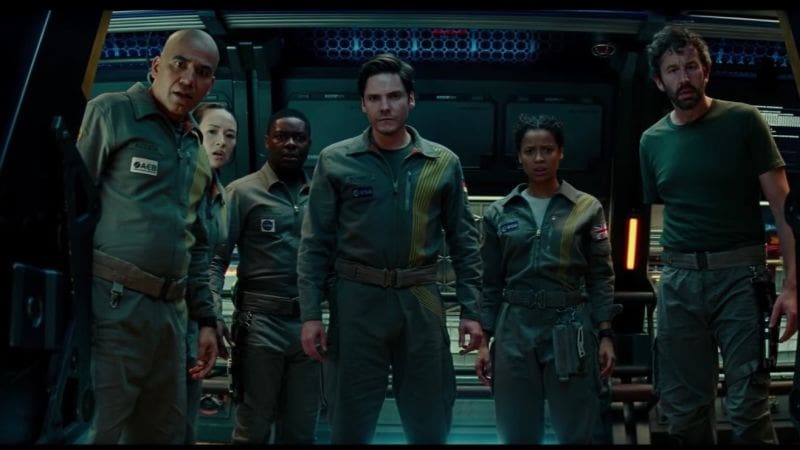
Cloverfield Paradox Plot Summary:
After a terrible accident with their particle accelerator, the crew of a space station race to figure out what happened and get back home before the mysterious events the accident caused tear the station apart.
Hey, did you guys hear a new Cloverfield movie came out yesterday?
You could be forgiven if not: Netflix announced The Cloverfield Paradox during a Super Bowl commercial and then released it on their streaming platform as soon as the game ended. That’s just the latest audacious move for the most experimentally marketed Hollywood franchise. For the original Cloverfield, some fairly criticized it for having more interesting marketing than actual movie, while the shock of 10 Cloverfield Lane’s stealth release amplified the surprise of how good it was. So where does this one fall on that scale?
The Cloverfield Paradox leans a little harder into the more well-received second movie by featuring as its protagonist a woman recently suffering from tragedy, Ava Hamilton (Gugu Mbatha-Raw). Hamilton decides to join the crew of a space station attempting to solve the world’s energy crisis with a particle accelerator (somehow…?), partially out of altruism, partially to get away from her personal trauma.
As far as protagonists go, you never quite reach the level of nail-biting concern that you do for Mary Elizabeth Winstead’s Michelle in the previous movie, but Hamilton is a fairly well-drawn character, and Gugu Mbatha-Raw is a terrific actress. The rest of the crew is your usual assortment of stock characters and cliches, with the only possible stand-out being Mina Jensen (Elizabeth Debicki), an engineer of mysterious origin who adds an air of unearthly menace to many of her scenes.
What’s really unique about this entry in the franchise, though, is how much it indulges in full-on schlocky sci-fi. A prequel of sorts, it purports to explain what caused the events of the previous films, but its explanation is so broad and absurd you could justify calling nearly anything a Cloverfield movie.
Similarly, this film takes an extremely thin veneer of science and uses it to justify pretty much whatever it feels like. If you don’t mind your sci-fi incredibly soft, this is actually one of the movie’s biggest assets. It makes the proceedings unpredictable, and some of the most memorable set pieces have a kind of feverish creativity to them that’s very compelling. There’s one scene involving an arm that might sit in your head for weeks after viewing.
In fact, the movie’s failure to fully commit itself to schlock is the reason it doesn’t quite work. The strongest section by far is the second third, after the disaster has occurred but before they understand what happened. The sense that anything could happen frays on the characters’ nerves as much as the viewer’s, and the movie is suffused with a malevolent presence that could strike at any moment.
But the second that an “explanation” is offered for what happened, nearly all the creativity that so enlivened the movie leaves it. This final act is much more conventional, capped off with a final confrontation that entirely eschews any fantastical elements. Without indulgent schlock, you’re left with a pretty weak story that doesn’t have much to offer beyond cliches. It’s a disappointing turn for the movie to take, one that doesn’t seem to understand what was fun about it.
Another consequence of the turn away from schlock is that it becomes hard to ignore how much of the movie is total nonsense. There is precious little internal logic to anything that happens here, whether that be random events or character actions. People trust or distrust others at the drop of a hat, characters will be sinister and suspicious one second and completely benign the next, and even once given an explanation there’s little rhyme or reason to why anything happens.
It would be easier to forgive if it was leavened with a steady supply of dumb fun, but once that dries up there’s not much left to do but dwell on these questions. One gets the sense that, just like the past two movies, this one is simply better off without any concrete explanations.
All that being said, there still is plenty of fun to be had in The Cloverfield Paradox. The movie powers through most of its nonsense on sheer momentum, and there’s a significant chunk of movie before it starts to run out of creativity. Just don’t expect anything nearly as tightly made or compelling as 10 Cloverfield Lane. And regardless of quality, the novelty of its announcement and release is still a pretty big milestone for the history of cinema. It just would have been nice if it could have risen above that novelty to stand better on its own.
Rating: 6 out of 10

